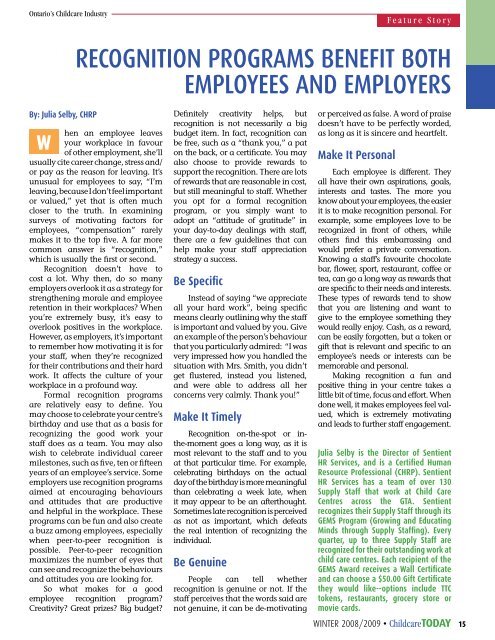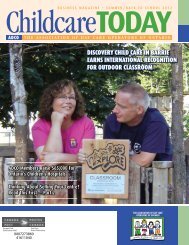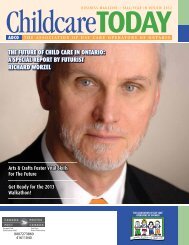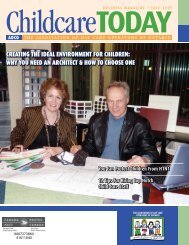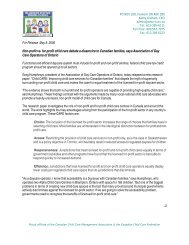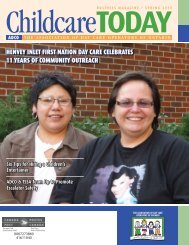childcare Today - ADCO :: The Association of Day Care Operators of ...
childcare Today - ADCO :: The Association of Day Care Operators of ...
childcare Today - ADCO :: The Association of Day Care Operators of ...
You also want an ePaper? Increase the reach of your titles
YUMPU automatically turns print PDFs into web optimized ePapers that Google loves.
Ontario’s Childcare Industry<br />
Feature Story<br />
Recognition Programs Benefit Both<br />
Employees and Employers<br />
By: Julia Selby, CHRP<br />
W<br />
hen an employee leaves<br />
your workplace in favour<br />
<strong>of</strong> other employment, she’ll<br />
usually cite career change, stress and/<br />
or pay as the reason for leaving. It’s<br />
unusual for employees to say, “I’m<br />
leaving, because I don’t feel important<br />
or valued,” yet that is <strong>of</strong>ten much<br />
closer to the truth. In examining<br />
surveys <strong>of</strong> motivating factors for<br />
employees, “compensation” rarely<br />
makes it to the top five. A far more<br />
common answer is “recognition,”<br />
which is usually the first or second.<br />
Recognition doesn’t have to<br />
cost a lot. Why then, do so many<br />
employers overlook it as a strategy for<br />
strengthening morale and employee<br />
retention in their workplaces When<br />
you’re extremely busy, it’s easy to<br />
overlook positives in the workplace.<br />
However, as employers, it’s important<br />
to remember how motivating it is for<br />
your staff, when they’re recognized<br />
for their contributions and their hard<br />
work. It affects the culture <strong>of</strong> your<br />
workplace in a pr<strong>of</strong>ound way.<br />
Formal recognition programs<br />
are relatively easy to define. You<br />
may choose to celebrate your centre’s<br />
birthday and use that as a basis for<br />
recognizing the good work your<br />
staff does as a team. You may also<br />
wish to celebrate individual career<br />
milestones, such as five, ten or fifteen<br />
years <strong>of</strong> an employee’s service. Some<br />
employers use recognition programs<br />
aimed at encouraging behaviours<br />
and attitudes that are productive<br />
and helpful in the workplace. <strong>The</strong>se<br />
programs can be fun and also create<br />
a buzz among employees, especially<br />
when peer-to-peer recognition is<br />
possible. Peer-to-peer recognition<br />
maximizes the number <strong>of</strong> eyes that<br />
can see and recognize the behaviours<br />
and attitudes you are looking for.<br />
So what makes for a good<br />
employee recognition program<br />
Creativity Great prizes Big budget<br />
Definitely creativity helps, but<br />
recognition is not necessarily a big<br />
budget item. In fact, recognition can<br />
be free, such as a “thank you,” a pat<br />
on the back, or a certificate. You may<br />
also choose to provide rewards to<br />
support the recognition. <strong>The</strong>re are lots<br />
<strong>of</strong> rewards that are reasonable in cost,<br />
but still meaningful to staff. Whether<br />
you opt for a formal recognition<br />
program, or you simply want to<br />
adopt an “attitude <strong>of</strong> gratitude” in<br />
your day-to-day dealings with staff,<br />
there are a few guidelines that can<br />
help make your staff appreciation<br />
strategy a success.<br />
Be Specific<br />
Instead <strong>of</strong> saying “we appreciate<br />
all your hard work”, being specific<br />
means clearly outlining why the staff<br />
is important and valued by you. Give<br />
an example <strong>of</strong> the person’s behaviour<br />
that you particularly admired: “I was<br />
very impressed how you handled the<br />
situation with Mrs. Smith, you didn’t<br />
get flustered, instead you listened,<br />
and were able to address all her<br />
concerns very calmly. Thank you!”<br />
Make It Timely<br />
Recognition on-the-spot or inthe-moment<br />
goes a long way, as it is<br />
most relevant to the staff and to you<br />
at that particular time. For example,<br />
celebrating birthdays on the actual<br />
day <strong>of</strong> the birthday is more meaningful<br />
than celebrating a week late, when<br />
it may appear to be an afterthought.<br />
Sometimes late recognition is perceived<br />
as not as important, which defeats<br />
the real intention <strong>of</strong> recognizing the<br />
individual.<br />
Be Genuine<br />
People can tell whether<br />
recognition is genuine or not. If the<br />
staff perceives that the words said are<br />
not genuine, it can be de-motivating<br />
or perceived as false. A word <strong>of</strong> praise<br />
doesn’t have to be perfectly worded,<br />
as long as it is sincere and heartfelt.<br />
Make It Personal<br />
Each employee is different. <strong>The</strong>y<br />
all have their own aspirations, goals,<br />
interests and tastes. <strong>The</strong> more you<br />
know about your employees, the easier<br />
it is to make recognition personal. For<br />
example, some employees love to be<br />
recognized in front <strong>of</strong> others, while<br />
others find this embarrassing and<br />
would prefer a private conversation.<br />
Knowing a staff’s favourite chocolate<br />
bar, flower, sport, restaurant, c<strong>of</strong>fee or<br />
tea, can go a long way as rewards that<br />
are specific to their needs and interests.<br />
<strong>The</strong>se types <strong>of</strong> rewards tend to show<br />
that you are listening and want to<br />
give to the employee something they<br />
would really enjoy. Cash, as a reward,<br />
can be easily forgotten, but a token or<br />
gift that is relevant and specific to an<br />
employee’s needs or interests can be<br />
memorable and personal.<br />
Making recognition a fun and<br />
positive thing in your centre takes a<br />
little bit <strong>of</strong> time, focus and effort. When<br />
done well, it makes employees feel valued,<br />
which is extremely motivating<br />
and leads to further staff engagement.<br />
Julia Selby is the Director <strong>of</strong> Sentient<br />
HR Services, and is a Certified Human<br />
Resource Pr<strong>of</strong>essional (CHRP). Sentient<br />
HR Services has a team <strong>of</strong> over 130<br />
Supply Staff that work at Child <strong>Care</strong><br />
Centres across the GTA. Sentient<br />
recognizes their Supply Staff through its<br />
GEMS Program (Growing and Educating<br />
Minds through Supply Staffing). Every<br />
quarter, up to three Supply Staff are<br />
recognized for their outstanding work at<br />
child care centres. Each recipient <strong>of</strong> the<br />
GEMS Award receives a Wall Certificate<br />
and can choose a $50.00 Gift Certificate<br />
they would like--options include TTC<br />
tokens, restaurants, grocery store or<br />
movie cards.<br />
WINTER 2008/2009 • ChildcareTODAY 15


